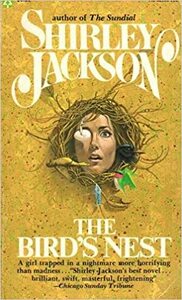Take a photo of a barcode or cover
This, Shirley Jackson’s third novel, came out six years after “The Lottery” and five years before The Haunting of Hill House. It is clear that what she is interested in are themes that encompass the dark depths humanity can sink to and intensely character-driven stories. Though I don’t think The Bird’s Nest can be considered a Gothic novel (like her last two and more well-known books), it shows clear ruminations on interiority and deeply emotional characters and the creation of a dark, tense atmosphere through the writing—hallmarks of Gothic writing.
The book centers around young Elizabeth, who seems ordinary enough: under her aunt’s thumb, plagued by headaches, shepherded back and forth from a boring, repetitive job at the history museum. The most interesting thing about her is the strange building she works in, one side of it sinking and upsetting the balance of the whole museum. And of course the hole in the wall right beside her desk.
Isn’t that really the start of it all? A great gaping hole where it shouldn’t be, revealing the inner machinations and foibles of a building crumbling into its foundation. From the outside, everything seems to be just fine, but come inside and maybe you’ll sense that the floor is slightly uneven, a marble rolling cleanly across it, a slight feeling vertigo when you come around the corner.
This off-kilter building creates the tingle of foreshadowing, the ominous buildup for what is to come when Elizabeth begins losing time, splintering, showing off the other sides of herself that have been hidden inside. And this is the perfect example of why I love Shirley Jackson’s writing. She creates these strange, almost whimsical, moments that completely distract you from the character or the plot. And though they seem innocuous, there is something off, and you realize that you’ve actually been holding your breath, feeling your stomach clench up. Jackson creates an ominous undercurrent with these types of scenes, weaving into our subconscious that there is something larger at play—that it will all tie in and once we know the full truth, we might be sorry we ever poked our noses in to find out at all.
The Bird’s Nest is really not as dark and brooding as I’ve made it sound. The characters of Dr. Wright and Aunt Morgen are quite humorous and tend toward the extreme, as Jackson characters do. Though Elizabeth’s personalities are not all friendly, their interactions with the doctor and even with each other do not offer a sense of tension or horror. Instead, there is the classic Jackson sharpened brilliance and aslant witticism, each character completely their own person—fully developed and springing from the page (if not from that slightly heightened reality I always feel Jackson is writing from).
At the same time, Jackson manages to capture a very humanistic story. Elizabeth’s story is a coming-of-age tale of sorts, and possibly more importantly, one about female identity and the lack of control women felt about their lives and selves during this time period. While it seems like everyone else is concerned with condensing her back into one person, what she is worried about is losing each distinct self, how the creation of one Elizabeth would stamp out all the others.
Though the ending does feel rather tidy and warm compared to the open-ended shock of her darker writings, The Bird’s Nest is a psychologically driven and well-rounded exploration of a now over-used trope that still feels fresh, all these years later.
The book centers around young Elizabeth, who seems ordinary enough: under her aunt’s thumb, plagued by headaches, shepherded back and forth from a boring, repetitive job at the history museum. The most interesting thing about her is the strange building she works in, one side of it sinking and upsetting the balance of the whole museum. And of course the hole in the wall right beside her desk.
Isn’t that really the start of it all? A great gaping hole where it shouldn’t be, revealing the inner machinations and foibles of a building crumbling into its foundation. From the outside, everything seems to be just fine, but come inside and maybe you’ll sense that the floor is slightly uneven, a marble rolling cleanly across it, a slight feeling vertigo when you come around the corner.
This off-kilter building creates the tingle of foreshadowing, the ominous buildup for what is to come when Elizabeth begins losing time, splintering, showing off the other sides of herself that have been hidden inside. And this is the perfect example of why I love Shirley Jackson’s writing. She creates these strange, almost whimsical, moments that completely distract you from the character or the plot. And though they seem innocuous, there is something off, and you realize that you’ve actually been holding your breath, feeling your stomach clench up. Jackson creates an ominous undercurrent with these types of scenes, weaving into our subconscious that there is something larger at play—that it will all tie in and once we know the full truth, we might be sorry we ever poked our noses in to find out at all.
The Bird’s Nest is really not as dark and brooding as I’ve made it sound. The characters of Dr. Wright and Aunt Morgen are quite humorous and tend toward the extreme, as Jackson characters do. Though Elizabeth’s personalities are not all friendly, their interactions with the doctor and even with each other do not offer a sense of tension or horror. Instead, there is the classic Jackson sharpened brilliance and aslant witticism, each character completely their own person—fully developed and springing from the page (if not from that slightly heightened reality I always feel Jackson is writing from).
At the same time, Jackson manages to capture a very humanistic story. Elizabeth’s story is a coming-of-age tale of sorts, and possibly more importantly, one about female identity and the lack of control women felt about their lives and selves during this time period. While it seems like everyone else is concerned with condensing her back into one person, what she is worried about is losing each distinct self, how the creation of one Elizabeth would stamp out all the others.
Though the ending does feel rather tidy and warm compared to the open-ended shock of her darker writings, The Bird’s Nest is a psychologically driven and well-rounded exploration of a now over-used trope that still feels fresh, all these years later.
The Bird's Nest centers around Elizabeth Richmond, a woman with dissociative identity disorder. Throughout the narrative, she struggles to control her other personalities, Bess, Beth, and Betsy. One or the other causes chaos in Elizabeth by seizing control at varying times.
Doctor Wright and Aunt Morgen are supporting characters. They both have immense influence on the personalities and the story overall. I liked all the characters, especially the personalities. My favorite was Betsy since she's a devil and exceedingly tumultuous. Her chapter POV was the best part of the book for me.
I enjoyed this Jackson novel. The more I read by her, I fall deeper and deeper in love with her mind. Her stories are always convoluted and require attention while reading. Often requiring a reread to fully grasp the story and Jackson's point. It's one of my favorite kinds of stories. I like to think!!
Doctor Wright and Aunt Morgen are supporting characters. They both have immense influence on the personalities and the story overall. I liked all the characters, especially the personalities. My favorite was Betsy since she's a devil and exceedingly tumultuous. Her chapter POV was the best part of the book for me.
I enjoyed this Jackson novel. The more I read by her, I fall deeper and deeper in love with her mind. Her stories are always convoluted and require attention while reading. Often requiring a reread to fully grasp the story and Jackson's point. It's one of my favorite kinds of stories. I like to think!!
challenging
dark
tense
medium-paced
Plot or Character Driven:
Character
Strong character development:
Complicated
Loveable characters:
No
Diverse cast of characters:
No
Flaws of characters a main focus:
Complicated
Graphic: Mental illness
challenging
dark
tense
medium-paced
Plot or Character Driven:
Character
Strong character development:
Yes
Loveable characters:
Complicated
Diverse cast of characters:
No
Flaws of characters a main focus:
Yes
I finished The Bird’s Nest in three wholesome days. And wholesome they were, due to the great prose I was able to dive into upon any chance I could get.
Shirley Jackson is an inspiration; her unique voice consistently shows the reader the complexities of the human condition and more specifically what it is to be a woman. Jackson balances scenic descriptions – “Miss Jone’s home was ugly. It had been freely embellished outside with many of the small details which so depress a lover of the classic in architecture; it was heavy with wooden lace and startling turrets, and gave the impression (and here I confess I am malicious) of having been assembled by the same artistic hand as Miss Jones.” (172) – and intricate characterisation – “Morgen came downstairs and found her refrigerator full of mud. Swift-change artists she could countenance, mad doctors and fiendish scientists she might accept, burbling nieces with notions of stolen inheritances she could regard with composure, but she could not and would not endure any tampering with her refrigerator” (199) –beautifully. Only humour can stem from the clash of how it all exists on the page together. Jackson creates unique worlds which though they are bizarre and extreme hold a mirror up to the modern times we live in.
The Bird’s Nest begins with a museum in need of repair. It is clear to see how this building is in fact, a background metaphor for the repair protagonist Elizabeth must make on her own body. She suffers from what is now known as dissociative identity disorder. Her identity, a confusing mix of opposing extremes, is what the other characters: Aunt Morgen and Doctor Wright (each with their own chapter) want to save. But the search to save Elizabeth brings up a lot of thought-provoking questions about identity and reality. Who are we if we are always changing? Are we the person our relatives remember us as, before we were ill? The story is also a sensitive probe into the essence of grief and trauma. Elizabeth internalized her troubled childhood and so, like a building weakens when its contents get too much (I can’t help thinking of the staff offices at Birkbeck. Academics with empty shelfs because the walls can’t support the strain of books) her mind has started to react to the pressure. This has resulted in her “four warring personalities.”
Thank you Shirley Jackson for writing this book, it’s absolutely brilliant!
Shirley Jackson is an inspiration; her unique voice consistently shows the reader the complexities of the human condition and more specifically what it is to be a woman. Jackson balances scenic descriptions – “Miss Jone’s home was ugly. It had been freely embellished outside with many of the small details which so depress a lover of the classic in architecture; it was heavy with wooden lace and startling turrets, and gave the impression (and here I confess I am malicious) of having been assembled by the same artistic hand as Miss Jones.” (172) – and intricate characterisation – “Morgen came downstairs and found her refrigerator full of mud. Swift-change artists she could countenance, mad doctors and fiendish scientists she might accept, burbling nieces with notions of stolen inheritances she could regard with composure, but she could not and would not endure any tampering with her refrigerator” (199) –beautifully. Only humour can stem from the clash of how it all exists on the page together. Jackson creates unique worlds which though they are bizarre and extreme hold a mirror up to the modern times we live in.
The Bird’s Nest begins with a museum in need of repair. It is clear to see how this building is in fact, a background metaphor for the repair protagonist Elizabeth must make on her own body. She suffers from what is now known as dissociative identity disorder. Her identity, a confusing mix of opposing extremes, is what the other characters: Aunt Morgen and Doctor Wright (each with their own chapter) want to save. But the search to save Elizabeth brings up a lot of thought-provoking questions about identity and reality. Who are we if we are always changing? Are we the person our relatives remember us as, before we were ill? The story is also a sensitive probe into the essence of grief and trauma. Elizabeth internalized her troubled childhood and so, like a building weakens when its contents get too much (I can’t help thinking of the staff offices at Birkbeck. Academics with empty shelfs because the walls can’t support the strain of books) her mind has started to react to the pressure. This has resulted in her “four warring personalities.”
Thank you Shirley Jackson for writing this book, it’s absolutely brilliant!
adventurous
challenging
medium-paced
Like many of Jackson's books, I'm going to have to read this at least one more time to really develop an opinion on it.
I liked this. It was entertaining. But I'm not sure I understand exactly what happened to make this woman have 4 personalities.
funny
tense
medium-paced
Plot or Character Driven:
Character
Strong character development:
Yes
Loveable characters:
Complicated
Diverse cast of characters:
Complicated
Flaws of characters a main focus:
Yes
reflective
slow-paced
Plot or Character Driven:
Character
Loveable characters:
Complicated
This is an imaginative but uneven short novel, and since it was written in the 50s, it must’ve been one of the first treatments of multiple personality syndrome.
The main character, Elizabeth, is really interesting, and Jackson moves among her personalities very deftly. The doctor, who gets some first person narrative of his own, is erudite and a bit pompous. He gets aggravated every once in a while and decides to stop treating Elizabeth, so he’s a bit more human than your average wise doctor in fiction. He’s pretty clear that he has no idea how to treat this woman.
Elizabeth’s aunt Morgen is a prominent character, but she never really came together for me, since her dialogue veers wildly. At one point, we see her house’s decor through the doctor’s eyes, and this gives us some clues about her character. Of course, we often see Morgen through Elizabeth’s eyes, so maybe that’s why she seems so fragmented.
There’s a lot of dry wit in the writing, and one of the funniest scenes is when the doctor, Elizabeth and her aunt go to visit a rather boring couple, Mr and Mrs Arrow. Mr Arrow attempts to make conventional conversation out of the doctor’s wild ramblings.
This novel resists the urge to tell us what Elizabeth’s childhood trauma was all about, so we’re just left with a lot of hints. It does wrap itself up rather nicely, though.
The main character, Elizabeth, is really interesting, and Jackson moves among her personalities very deftly. The doctor, who gets some first person narrative of his own, is erudite and a bit pompous. He gets aggravated every once in a while and decides to stop treating Elizabeth, so he’s a bit more human than your average wise doctor in fiction. He’s pretty clear that he has no idea how to treat this woman.
Elizabeth’s aunt Morgen is a prominent character, but she never really came together for me, since her dialogue veers wildly. At one point, we see her house’s decor through the doctor’s eyes, and this gives us some clues about her character. Of course, we often see Morgen through Elizabeth’s eyes, so maybe that’s why she seems so fragmented.
There’s a lot of dry wit in the writing, and one of the funniest scenes is when the doctor, Elizabeth and her aunt go to visit a rather boring couple, Mr and Mrs Arrow. Mr Arrow attempts to make conventional conversation out of the doctor’s wild ramblings.
This novel resists the urge to tell us what Elizabeth’s childhood trauma was all about, so we’re just left with a lot of hints. It does wrap itself up rather nicely, though.






